|
Online links to scriptures (New International Version [NIV] unless otherwise stated) are shown in blue
| 3. FROM KINGS TO KINGDOM continued |
|
|
| THE EARLY CHURCH |
|
 The early church was initially quite small, often like house groups today, meeting in different cities and towns throughout the region. The early church was initially quite small, often like house groups today, meeting in different cities and towns throughout the region.
Unlike the established Jewish system with its hierarchy of priests and rabbis who made their living out of the tithes and offerings of the people, the fledgling churches, as far as we are aware, had no paid local leadership. All believers were considered to be 'brothers' (including sisters!) and the focus was upon the leadership of Christ.
|
|
|
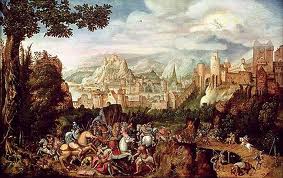 There were travelling ministries whom the local church supported when required. Of course, at this time there was no printed New Testament. The only ways believers could learn more of the teachings of Jesus was through itinerant ministries or the letters and writings of those who had been with Jesus during His life, or as in the case of Paul, through the miraculous meeting on the road to Amaeus. There were travelling ministries whom the local church supported when required. Of course, at this time there was no printed New Testament. The only ways believers could learn more of the teachings of Jesus was through itinerant ministries or the letters and writings of those who had been with Jesus during His life, or as in the case of Paul, through the miraculous meeting on the road to Amaeus.
Acts 9:1-9
|
|
|
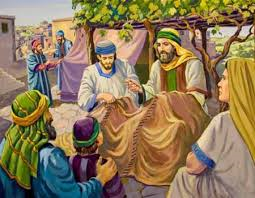 Paul is the most comprehensive example we have of early Christian leadership. From what we know or can glean he wasn't an impressive person in appearance or eloquent of speech. But he was an excellent writer. God chose the author of much of the New Testament well! Paul is the most comprehensive example we have of early Christian leadership. From what we know or can glean he wasn't an impressive person in appearance or eloquent of speech. But he was an excellent writer. God chose the author of much of the New Testament well!
His ministry trips took years rather the days we relate to today. He would stay in an area for considerable lengths of time. While he would accept gifts from the people, he did not expect them. In fact, through his trade of tent making, he took great pains not to be a burden upon the local believers, making tents and selling them to pay his own living expenses.
|
|
|
 Probably the best understanding of his motivation comes in the introductions to his various letters. Paul was an apostle, appointed by Jesus himself! The highest appointment recommendation one could get! Yet, let's look at how he introduced himself in his writings. Probably the best understanding of his motivation comes in the introductions to his various letters. Paul was an apostle, appointed by Jesus himself! The highest appointment recommendation one could get! Yet, let's look at how he introduced himself in his writings.
"Paul, a servant of Christ Jesus, called to be an apostle and set apart for the gospel of God", "Paul, called to be an apostle of Christ Jesus by the will of God", "Paul, an apostle of Christ Jesus by the will of God", "Paul, an apostle—sent not from men nor by man, but by Jesus Christ and God the Father", "Paul, an apostle of Christ Jesus by the will of God,", "Paul and Timothy, servants of Christ Jesus", Paul, an apostle of Christ Jesus by the will of God, "Paul, an apostle of Christ Jesus by the will of God", "Paul, Silas and Timothy", "Paul, Silas and Timothy", "Paul, a servant of God and an apostle of Jesus Christ", "Paul, a prisoner of Christ Jesus".
|
|
|
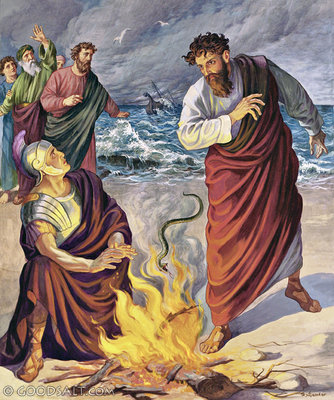 Paul would describe his apostolic role, but not once did he ascribe himself a title. Paul would describe his apostolic role, but not once did he ascribe himself a title.
It is also interesting to see the development through the books as they are printed in the Bible. In the early books he describes himself as an apostle, then as one working with others, next a servant, and finally as a prisoner (both literal and spiritual!). What a progression and the opposite of what we generally see today.
|
|
|
 As Paul grew in the Lord, the more humble he became! Truly a lesson for us all! As Paul grew in the Lord, the more humble he became! Truly a lesson for us all!
|
|
|
Very early on, the challenges of growth brought about practical problems leading to a 'division of labour' within the running of the church.
Acts 6:1-4
|
|
|
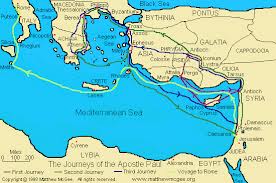 As we progress through the New Testament we start to see conflict arising between people and, in a very human way, people trying to gain influence over others. Paul liked to preach and teach about Jesus, but you get the feeling that he experienced frustration as he increasingly had to spend more and more time sorting out differences between people, dealing with both heresies and behavioral problems that quickly crept into the fledging churches. As we progress through the New Testament we start to see conflict arising between people and, in a very human way, people trying to gain influence over others. Paul liked to preach and teach about Jesus, but you get the feeling that he experienced frustration as he increasingly had to spend more and more time sorting out differences between people, dealing with both heresies and behavioral problems that quickly crept into the fledging churches.
2 Corinthians 10:1-2
|
|
|
 As mentioned earlier, writing was Paul's real strength. He was not an attractive person, nor a great orator, qualities we all too often look to in leadership today - and no doubt, then also. We still fall for the 'King Saul syndrome', that has been a failure from the earliest of times! Paul was not a great leader in a worldly sense yet his influence through writing Scripture has seen (God through) him have more influence on history than almost any other, except Jesus Himself, before or since. His words have been read and contemplated by millions and now billions over the past 2000 odd years. Amazing! As mentioned earlier, writing was Paul's real strength. He was not an attractive person, nor a great orator, qualities we all too often look to in leadership today - and no doubt, then also. We still fall for the 'King Saul syndrome', that has been a failure from the earliest of times! Paul was not a great leader in a worldly sense yet his influence through writing Scripture has seen (God through) him have more influence on history than almost any other, except Jesus Himself, before or since. His words have been read and contemplated by millions and now billions over the past 2000 odd years. Amazing!
He was humble;
1 Corinthians 15:9
|
|
|
For Paul, Jesus was everything and he was nothing.
|
|
|
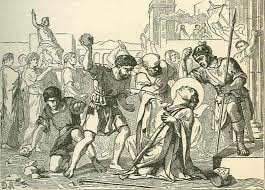 He ultimately gave his life in the natural too, as he had done in the spiritual, being executed in Rome around 67AD. He ultimately gave his life in the natural too, as he had done in the spiritual, being executed in Rome around 67AD.
|
| <i>NEXT WEEK:</i> TRANSFORMATION OF THE CHURCH: <i>3. FROM KINGS TO KINGDOM</i> continues |
|
 We look at relationships in the time of Jesus and the early church. We look at relationships in the time of Jesus and the early church.
|
| A NOTE FROM DAVID |
|
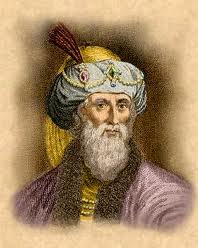 It is extremely difficult to be a 'Jesus-like' leader in the church! It is extremely difficult to be a 'Jesus-like' leader in the church!
Godly leadership is unnatural to us in our human condition. It can only be inherited through the complete submission of our lives to Jesus.
Extra-Biblical Historical Evidence for the LIFE, DEATH, and RESURRECTION of JESUS
ANCIENT NON-CHRISTIAN SOURCES
Flavius Josephus (37-97 AD), court historian for Emperor Vespasian: (Pictured)
"At this time there was a wise man who was called Jesus. And his conduct was good and he was known to be virtuous. And many people from among the Jews and other nations became his disciples. Pilate condemned him to be crucified and to die. And those who had become his disciples did not abandon his discipleship. They reported that he had appeared to them three days after his crucifixion and that he was alive; accordingly, he was perhaps the messiah concerning whom the prophets have recounted wonders." (Arabic translation)
Julius Africanus,
Writing around 221 AD, found a reference in the writings of Thallus, who wrote a history of the Eastern Mediterranean around 52 AD, which dealt with the darkness that covered the land during Jesus's crucifixion:
"Thallus, in the third book of his histories, explains away the darkness as an eclipse of the sun--unreasonably, as it seems to me." [A solar eclipse could not take place during a full moon, as was the case during Passover season.]
|
So until next week.......
MAY GOD BLESS YOU AND YOU BLESS GOD!
His servant and yours

Learn more about us at...
www.wwj.org.nz/about.php
|
A DAVID'S DOODLING
244. The believer serves the Lord in strength, but the disciple is made perfect through weakness.
David Tait
|
Check
out the WWJ website for….
More David's Doodlings: www.wwj.org.nz/dd.php
Waxing Lyrical: http://www.wwj.org.nz/waxing.php
If Only I'd Thought of it: http://www.wwj.org.nz/thought.php
Laughing at Ourselves: http://www.wwj.org.nz/laugh.php
A look at some of lifes curious questions: http://www.wwj.org.nz/why.php
|

 The early church was initially quite small, often like house groups today, meeting in different cities and towns throughout the region.
The early church was initially quite small, often like house groups today, meeting in different cities and towns throughout the region.  There were travelling ministries whom the local church supported when required. Of course, at this time there was no printed New Testament. The only ways believers could learn more of the teachings of Jesus was through itinerant ministries or the letters and writings of those who had been with Jesus during His life, or as in the case of Paul, through the miraculous meeting on the road to Amaeus.
There were travelling ministries whom the local church supported when required. Of course, at this time there was no printed New Testament. The only ways believers could learn more of the teachings of Jesus was through itinerant ministries or the letters and writings of those who had been with Jesus during His life, or as in the case of Paul, through the miraculous meeting on the road to Amaeus.  Paul is the most comprehensive example we have of early Christian leadership. From what we know or can glean he wasn't an impressive person in appearance or eloquent of speech. But he was an excellent writer. God chose the author of much of the New Testament well!
Paul is the most comprehensive example we have of early Christian leadership. From what we know or can glean he wasn't an impressive person in appearance or eloquent of speech. But he was an excellent writer. God chose the author of much of the New Testament well! Probably the best understanding of his motivation comes in the introductions to his various letters. Paul was an apostle, appointed by Jesus himself! The highest appointment recommendation one could get! Yet, let's look at how he introduced himself in his writings.
Probably the best understanding of his motivation comes in the introductions to his various letters. Paul was an apostle, appointed by Jesus himself! The highest appointment recommendation one could get! Yet, let's look at how he introduced himself in his writings. Paul would describe his apostolic role, but not once did he ascribe himself a title.
Paul would describe his apostolic role, but not once did he ascribe himself a title. As Paul grew in the Lord, the more humble he became! Truly a lesson for us all!
As Paul grew in the Lord, the more humble he became! Truly a lesson for us all!  As we progress through the New Testament we start to see conflict arising between people and, in a very human way, people trying to gain influence over others. Paul liked to preach and teach about Jesus, but you get the feeling that he experienced frustration as he increasingly had to spend more and more time sorting out differences between people, dealing with both heresies and behavioral problems that quickly crept into the fledging churches.
As we progress through the New Testament we start to see conflict arising between people and, in a very human way, people trying to gain influence over others. Paul liked to preach and teach about Jesus, but you get the feeling that he experienced frustration as he increasingly had to spend more and more time sorting out differences between people, dealing with both heresies and behavioral problems that quickly crept into the fledging churches.  As mentioned earlier, writing was Paul's real strength. He was not an attractive person, nor a great orator, qualities we all too often look to in leadership today - and no doubt, then also. We still fall for the 'King Saul syndrome', that has been a failure from the earliest of times! Paul was not a great leader in a worldly sense yet his influence through writing Scripture has seen (God through) him have more influence on history than almost any other, except Jesus Himself, before or since. His words have been read and contemplated by millions and now billions over the past 2000 odd years. Amazing!
As mentioned earlier, writing was Paul's real strength. He was not an attractive person, nor a great orator, qualities we all too often look to in leadership today - and no doubt, then also. We still fall for the 'King Saul syndrome', that has been a failure from the earliest of times! Paul was not a great leader in a worldly sense yet his influence through writing Scripture has seen (God through) him have more influence on history than almost any other, except Jesus Himself, before or since. His words have been read and contemplated by millions and now billions over the past 2000 odd years. Amazing!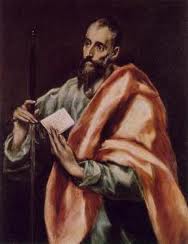 yet was sure in, and worked tirelessly at, His calling.
yet was sure in, and worked tirelessly at, His calling.  He ultimately gave his life in the natural too, as he had done in the spiritual, being executed in Rome around 67AD.
He ultimately gave his life in the natural too, as he had done in the spiritual, being executed in Rome around 67AD.  We look at relationships in the time of Jesus and the early church.
We look at relationships in the time of Jesus and the early church.  It is extremely difficult to be a 'Jesus-like' leader in the church!
It is extremely difficult to be a 'Jesus-like' leader in the church!